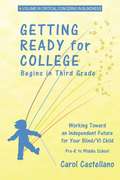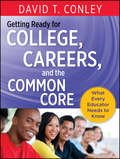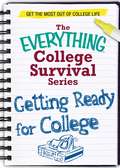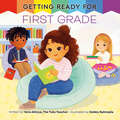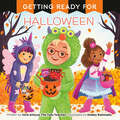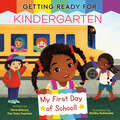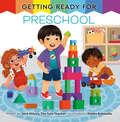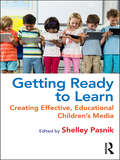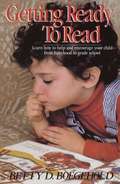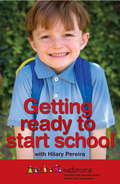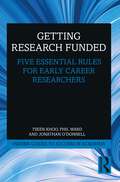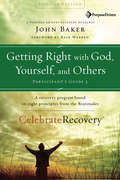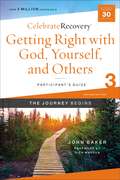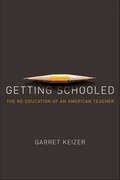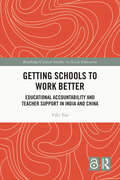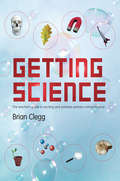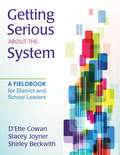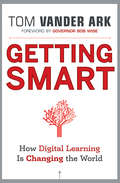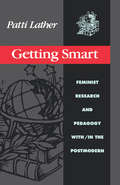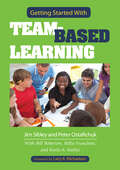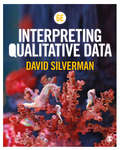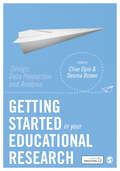- Table View
- List View
Getting Ready for College Begins in Third Grade: Working Toward an Independent Future for Your Blind/Visually Impaired Child (Critical Concerns in Blindness)
by Carol CastellanoAll parents hope for an independent future for their blindvisually impaired child. To turn that hope into a reality, parents need to understand the scope of skill development that must be addressed, along with the importance of equal expectations for the child's development, proper training, and opportunity to practice and develop skills. But what if expectations are low, training in blindness skills is scanty or even absent, and overprotection prevents the blindVI child from learning and practicing skills? The idea of an independent future can remain a distant dream. The purpose of this book is to guide parents and teachers in fostering the blindvisually impaired child's skill development in such critical areas as academics, independent movement and travel, social interaction, daily living, and self-advocacy, so that he or she will truly be on the road to an independent future. A practical, easy to use guide, written in plain English, the book warns about common problem areas and provides ideas for getting and keeping the child's education and development on track. It highlights the interplay between skills and competence, confidence, self-respect, and the respect of others. Of the small number of books and videos available on the subject, most were written by professionals in the field and many begin with the supposition that blindness is at best sad and at worst tragic. Few --maybe none --have the ardent passion for independence that the parent of a blindvisually impaired child brings to the subject. Instead of overwhelming parents and teachers with the difficulty of the undertaking before them, Getting Ready for College Begins in Third Grade will inspire their confidence and enthusiasm for the task at hand.
Getting Ready for College, Careers, and the Common Core
by David T. ConleyCreate programs that prepare students for college, careers, and the new and challenging assessments of the Common Core State Standards Written for all educators but with an emphasis on those at the secondary level, this important resource shows how to develop programs that truly prepare students for both the Common Core assessments and for college and career readiness. Based on multiple research studies conducted by Conley as well as experience he has gained from working with dozens of high schools that succeed with a wide range of students, the book provides specific strategies for teaching the CCSS in ways that improve readiness for college and careers for the full range of students. Draws from research-based models for creating programs for high school students that will ensure readiness for tests and for college and beyond Includes strategies and practices for teachers to help students develop postsecondary preparedness Is the third in a series of books on readiness written by David Conley, including College Knowledge and College and Career Ready Teachers can use this valuable resource to understand the "big picture" behind the Common Core State Standards, how to teach to them in ways that prepare students for new, challenging assessments being implemented over the next few years and, more importantly, how to help all students be ready for learning beyond high school.
Getting Ready for College: Get the most out of college life
by Adams MediaGet ready for the best years of your life!College Survival - Getting Ready for College contains everything you need to know about preparing for the next few years. With advice from deciding what to bring to your dorm room to the pitfalls of credit cards to the thrills of living on your own for the first time, you’ll be big man (or woman) on campus in no time.
Getting Ready for First Grade (Getting Ready)
by Vera AhiyyaGet ready for first grade in this exciting new series for kids embarking on new adventures! Vera Ahiyya, the Tutu Teacher, knows everything your family needs to get ready... and to celebrate every precious moment!It's Leilani's first day of first grade, and she is excited and a bit nervous. But thanks to her caring family and friendly new teacher, Mr. Gray, she soon learns all about the fun things they will make and do in the classroom that year. Soon, she gains confidence that she has what it takes to be a first grader! Vera Ahiyya&’s engaging read-aloud will help your child prepare for and succeed in first grade and beyond, just like Leilani.
Getting Ready for Halloween (Getting Ready)
by Vera AhiyyaGet ready to celebrate Halloween in this exciting new book in the Getting Ready series. Your little one will learn what to expect, from activities to costumes to treats.Halloween is here, and the whole class is getting ready for fun! With the help of their teacher, they play games, make arts and crafts, and even march in a costume parade. But will the day hold more tricks or treats? This engaging read-aloud will help your child prepare for Halloween, and all that comes along with it!
Getting Ready for Kindergarten (Getting Ready)
by Vera AhiyyaGet Ready for Kindergarten in this exciting new series for kids embarking on new adventures! Vera Ahiyya, the Tutu Teacher, knows everything your family needs to get ready... and to celebrate every precious moment!GET READY... for an exciting new series focusing on BIG moments in the lives of kids!It&’s almost the first day of school and everyone is busy getting ready. A young girl and her parent pack a healthy lunch, fill her backpack with supplies, pick out a colorful outfit, and take a special photo . . . but is that everything she will need for her big first day?Get your little one ready with this joyful story about what to expect on their very first day of Kindergarten! This edition includes an adorable punch-out sign for first day photo opps!
Getting Ready for Preschool (Getting Ready)
by Vera AhiyyaGet Ready for Preschool in this exciting new series for kids embarking on new adventures! Vera Ahiyya, the Tutu Teacher, knows everything your family needs to get ready... and to celebrate every precious moment!Includes an "I'm ready for preschool!" sign for photo opportunities!It&’s almost the first day of preschool and everyone is busy getting ready. A young boy and his family meet the teacher, post a family photo on the classroom wall, send a special lovey for naptime, pack a healthy lunch, and take a special photo . . . but is that everything he will need for his big first day? Maybe just one more hug first!Get your little one ready with this joyful story about what to expect on their very first day of preschool! This edition includes an adorable punch-out sign for first day photo opps!
Getting Ready to Learn: Creating Effective, Educational Children’s Media
by Shelley PasnikGetting Ready to Learn describes how educational media have and are continuing to play a role in meeting the learning needs of children, parents, and teachers. Based on years of meaningful data from the CPB-PBS Ready To Learn Initiative, chapters explore how to develop engaging, playful, and developmentally appropriate content. From Emmy-Award-winning series to randomized controlled trials, this book covers the media production, scholarly research and technological advances surrounding some of the country’s most beloved programming.
Getting Ready to Read: Learn How to Help and Encourage Your Child--from Babyhood to Grade School
by Bank St Coll-Boegehold BLearn how to help and encourage your child -- from babyhood to grade school.
Getting Ready to Start School
by Hilary Pereira Netmums Hollie SmithGETTING READY TO START SCHOOL covers everything from choosing and applying for primary schools, to preparing your child in order to making their transition as smooth as possible, to what to expect once they get there, including the impact on parents, as they adapt to the politics of the school gate and to life fitting round the school days and terms. With input from childcare professionals, experienced teachers and Netmums themselves, GETTING READY TO START SCHOOL is the only book a parent will need to plan their child’s first step into education and get them off to a happy start.
Getting Ready to Test: A Review and Preparation Manual for Drug And Alcohol Credentialing Examinations (Eighth Edition)
by Dlc PublishingStudy guide and preparation manual for drug/alcohol examinations
Getting Research Funded: Five Essential Rules for Early Career Researchers (Insider Guides to Success in Academia)
by Tseen Khoo Phil Ward Jonathan O'DonnellThis engaging, researcher-centred guide offers early career researchers foundational grants literacy that will serve them throughout their careers. It provides an insight into the culture of grantseeking, as well as tactics for grant writing. Getting Research Funded provides clear strategies on how to stage your research and understand project development, find aligned funding bodies and schemes, build strong research teams and partnerships, get the project right and effectively plan your grantseeking. Based in Australia and the UK, the authors use their knowledge and extensive engagement with global researcher cohorts to offer a well-honed understanding of the funding landscape, the pressures and priorities affecting ECRs and the best way to support them in effective grantseeking. This book is ideal reading for anyone looking for a succinct and supportive guide to ensure they have all the tools to get their research funded. The 'Insider Guides to Success in Academia' offers support and practical advice to doctoral students and early-career researchers. Covering the topics that really matter, but which often get overlooked, this indispensable series provides practical and realistic guidance to address many of the needs and challenges of trying to operate, and remain, in academia. These neat pocket guides fill specific and significant gaps in current literature. Each book offers insider perspectives on the often implicit rules of the game -- the things you need to know but usually aren't told by institutional postgraduate support, researcher development units, or supervisors -- and will address a practical topic that is key to career progression. They are essential reading for doctoral students, early-career researchers, supervisors, mentors, or anyone looking to launch or maintain their career in academia.
Getting Right with God, Yourself, and Others Participant's Guide 3
by John BakerA Program for Implementing a Christ-Centered Recovery Ministry in Your Church Alcoholism - Divorce - Sexual Abuse - Codependency - Domestic Violence - Drug Addiction - Sexual Addiction - Food Addiction - Gambling Addiction and many more! There is a way the church can help the hurting move beyond their wounds to experience the healing and forgiveness of Christ. Since 1991, more than 200,000 people have participated in the Celebrate Recovery programs offered at more than 3,500 churches, prisons, and rescue missions. Drawn from the Beatitudes, Celebrate Recovery helps people resolve painful problems in the context of the church as a whole. Newly updated, the kit includes: •1 20-minute DVD introductory guide for leaders •1 leader’s guide •1 of each participant’s guide (4 total) •CD-ROM with 25 lessons •CD-ROM with sermon transcripts and reproducible promotional materials •4-volume audio CD sermon series “And then there’s pastor John Baker, the founder of Celebrate Recovery… Big John and I shared something in common. We used to drink too much. And our hearts changed, and then we quit. That is a tried-and-true formula. The problem is government is not good at changing hearts. But people like John Baker have been good about it and successful doing that.” —President George W. Bush on Celebrate Recovery and its founder, John Baker, at the Faith- Based and Community Initiatives Conference, March 3, 2004.
Getting Right with God, Yourself, and Others Participant's Guide 3: A Recovery Program Based on Eight Principles from the Beatitudes (Celebrate Recovery)
by John BakerThe Celebrate Recovery Participant&’s Guides are essential tools for the personal recovery journey. In the seven lessons in Guide 3: Getting Right with God, Yourself, and Others, you will move through principles 5-7 of the recovery process:5 Openly examine and confess my faults to God, to myself, and to someone I trust. "Happy are the pure in heart" (Matthew 5:8).6 Voluntarily submit to every change God wants to make in my life and humbly ask Him to remove my character defects. "Happy are those whose greatest desire is to do what God requires" (Matthew 5:6).7 Evaluate all my relationships. Offer forgiveness to those who have hurt me and make amends for harm I've done to others, except when to do so would harm them or others. "Happy are the merciful" (Matthew 5:7). "Happy are the peacemakers" (Matthew 5:9).By working through the lessons and exercises found in each of the four Participant&’s Guides you will begin to experience the true peace and serenity you have been seeking, restore and develop stronger relationships with others and with God, and find freedom from life's hurts, hang-ups, and habits.All the scriptures have been updated to the new NIV 2011 version.
Getting Right with God, Yourself, and Others Participant's Guide 3: A Recovery Program Based on Eight Principles from the Beatitudes (Celebrate Recovery)
by John BakerThe Celebrate Recovery Participant's Guides are essential tools for the personal recovery journey. In the seven lessons in Guide 3: Getting Right with God, Yourself, and Others, you will move through principles 4-6 of the recovery process:4 Openly examine and confess my faults to God, to myself, and to someone I trust. "Happy are the pure in heart" (Matthew 5:8).5 Voluntarily submit to every change God wants to make in my life and humbly ask Him to remove my character defects. "Happy are those whose greatest desire is to do what God requires" (Matthew 5:6).6 Evaluate all my relationships. Offer forgiveness to those who have hurt me and make amends for harm I've done to others, except when to do so would harm them or others. "Happy are the merciful" (Matthew 5:7). "Happy are the peacemakers" (Matthew 5:9).By working through the lessons and exercises found in each of the four Participant's Guides you will begin to experience the true peace and serenity you have been seeking, restore and develop stronger relationships with others and with God, and find freedom from life's hurts, hang-ups, and habits. All the scriptures have been updated to the new NIV 2011 version.
Getting Schooled: The Re-Education of an American Teacher
by Garret KeizerIn this powerful, eloquent story of his return to the classroom, a former teacher offers a rousing defense of his beleaguered vocationPerhaps no profession is so constantly discussed, regulated, and maligned by non-practitioners as teaching. The voices of the teachers themselves are conspicuously missing. Defying this trend, teacher and writer Garret Keizer takes us to school—literally—in this arresting account of his return to the same rural Vermont high school where he taught fourteen years ago.Much has changed since then—a former student is his principal, standardized testing is the reigning god, and smoking in the boys' room has been supplanted by texting in the boys' room. More familiar are the effects of poverty, the exuberance of youth, and the staggering workload that technology has done as much to increase as to lighten. Telling the story of Keizer's year in the classroom, Getting Schooled takes us everywhere a teacher might go: from field trips to school plays to town meetings, from a kid's eureka moment to a parent's dark night of the soul.At once fiercely critical and deeply contemplative, Keizer exposes the obstacles that teachers face daily—and along the way takes aim at some cherished cant: that public education is doomed, that the heroic teacher is the cure for all that ails education, that educational reform can serve as a cheap substitute for societal reformation.Angry, humorous, and always hopeful, Getting Schooled is as good an argument as we are likely to hear for a substantive reassessment of our schools and those who struggle in them.
Getting Schools to Work Better: Educational Accountability and Teacher Support in India and China (Routledge Critical Studies in Asian Education)
by Yifei YanYifei Yan’s ambitious multi-method case study of government middle schools in Beijing and Delhi provides fresh insights into how educational accountability can be designed to work, in part and as a whole.Getting schools to work better is a challenge just about everywhere. Many policy experts prescribe measures for strengthening school accountability, either through government command and control or through alternative market and societal actors. In challenging this conventional wisdom, this book examines how China and India are tackling the challenge with a specific focus on supporting teachers along with traditional accountability-strengthening measures. The book draws implications from its case studies for how education systems can be designed towards the fulfilment of Sustainable Development Goal 4. It further develops the concept of "Accountability 3.0" to elucidate a novel and more holistic reconceptualisation of the appropriate means needed to fulfil multiple purposes of accountability, in which providing support to frontline workers is viewed as an integral component.This book will appeal to a wide spectrum of scholars and practitioners in the fields of comparative education, public administration, public policy and development studies, among others. It will be especially interesting to those from the developing world facing similar accountability challenges as described.
Getting Science: The Teacher's Guide to Exciting and Painless Primary School Science
by Brian CleggScience is rightly a fundamental part of primary school education, but that doesn’t make it easy to teach - especially for teachers without a science background. This straight talking book from an experienced science writer and communicator looks at how to make the most of it and give primary school children a good grounding in the topic. Getting Science sets out to engage the sense of wonder. The science in this book is not for the children, but for the adults who have to explain it. Starting with a whirlwind tour of the great milestones of modern science, Getting Science goes on to take each of the main curriculum topics and give it a new twist. It provides the information needed to understand the key topics better and be able to put them across with enthusiasm and energy. This book will help teachers to get children excited by science, to understand science rather than just answer questions. Getting Science makes science fun, approachable and comprehensible to those who just don’t get it.
Getting Serious About the System: A Fieldbook for District and School Leaders
by D'Ette F. Cowan Mr Stacey L. Joyner Shirley B. BeckwithA focused approach to raising student achievement This fieldbook shows how to focus on the issues that have most impact upon student achievement. This multidimensional process also will increase the competencies of everyone involved while implementing solutions districtwide. The authors outline the framework and step-by-step guidance for simultaneously addressing the essential components and competencies at multiple levels of the local educational system. Key strategies include: Concentrating on aligning curriculum, instruction, and assessment to state and Common Core State Standards Working on the underlying issues that are impacting the system Garnering support from all staff members to maximize time, resources, and energy
Getting Smart
by Tom Vander Ark Bob WiseA comprehensive look at the promise and potential of online learningIn our digital age, students have dramatically new learning needs and must be prepared for the idea economy of the future. In Getting Smart, well-known global education expert Tom Vander Ark examines the facets of educational innovation in the United States and abroad. Vander Ark makes a convincing case for a blend of online and onsite learning, shares inspiring stories of schools and programs that effectively offer "personal digital learning" opportunities, and discusses what we need to do to remake our schools into "smart schools."Examines the innovation-driven world, discusses how to combine online and onsite learning, and reviews "smart tools" for learningInvestigates the lives of learning professionals, outlines the new employment bargain, examines online universities and "smart schools"Makes the case for smart capital, advocates for policies that create better learning, studies smart cultures
Getting Smart: Feminist Research and Pedagogy within/in the Postmodern (Critical Social Thought)
by Patti LatherFirst published in 1991. Routledge is an imprint of Taylor & Francis, an informa company.
Getting Started With Beginning Writers
by Katie Wood Ray Lisa B. CleavelandHow can I help my youngest students become writers? How can I establish a routine for writing in my classroom? Why is making books developmentally appropriate? In Lisa Cleaveland's classroom, writing workshop is a time every day when her students make books. Katie Wood Ray guides you through the first days in Lisa's classroom, offering ideas, information, strategies, and tips to show you step by step how you can launch primary writing workshop with beginning writers. If you're a new teacher or new to writing workshop, A Teacher's Guide to Getting Started with Beginning Writers will show you in clear and simple terms what to do to establish a routine for writing in your classroom, offering you vision, insight, and practical support. If you're an experienced workshop teacher, Katie and Lisa will help you imagine new possibilities.
Getting Started With Team-Based Learning
by Jim Sibley Pete OstafichukThis book is written for anyone who has been inspired by the idea of Team-Based Learning (TBL) through his or her reading, a workshop, or a colleague’s enthusiasm, and then asks the inevitable question: how do I start?Written by five authors who use TBL in their teaching and who are internationally recognized as mentors and trainers of faculty making the switch to TBL, the book also presents the tips and insights of 46 faculty members from around the world who have adopted this teaching method.TBL is a uniquely powerful form of small group learning. It harnesses the power of teams and social learning with accountability structures and instructional sequences. This book provides the guidance, from first principles to examples of practice, together with concrete advice, suggestions, and tips to help you succeed in the TBL classroom. This book will help you understand what TBL is and why it is so powerful. You will find what you need to plan, build, implement, and use TBL effectively. This book will appeal to both the novice and the expert TBL teacher.
Getting Started in Your Educational Research: Design, Data Production and Analysis
by Clive Opie Desma BrownA one-stop shop for anyone undertaking educational research for the first time, this text focuses on the development and application of key skills necessary for successful research, Packed with useful exercises, checklists and case studies, this book will allow the reader to apply their skills across a range of essays, presentations and reports. Using digestible language to explain complex terminology and processes simply, the authors explore working with and presenting data and the software options available to students, including NVivo, SPSS and Excel. The text will help students to: - Understand the language of educational research - Frame their research questions and design their research - Judge the quality of educational research - Explore and justify research approaches and procedures (methods) - Analyse and present their data
Getting Started in Your Educational Research: Design, Data Production and Analysis
by Clive Opie Desma BrownA one-stop shop for anyone undertaking educational research for the first time, this text focuses on the development and application of key skills necessary for successful research. Packed with useful exercises, checklists and case studies, this book will allow the reader to apply their skills across a range of essays, presentations and reports. Using digestible language to explain complex terminology and processes simply, the authors explore working with and presenting data and the software options available to students, including NVivo, SPSS and Excel. The text will help students to: Understand the language of educational research Frame their research questions and design their research Judge the quality of educational research Explore and justify research approaches and procedures (methods) Analyse and present their data
